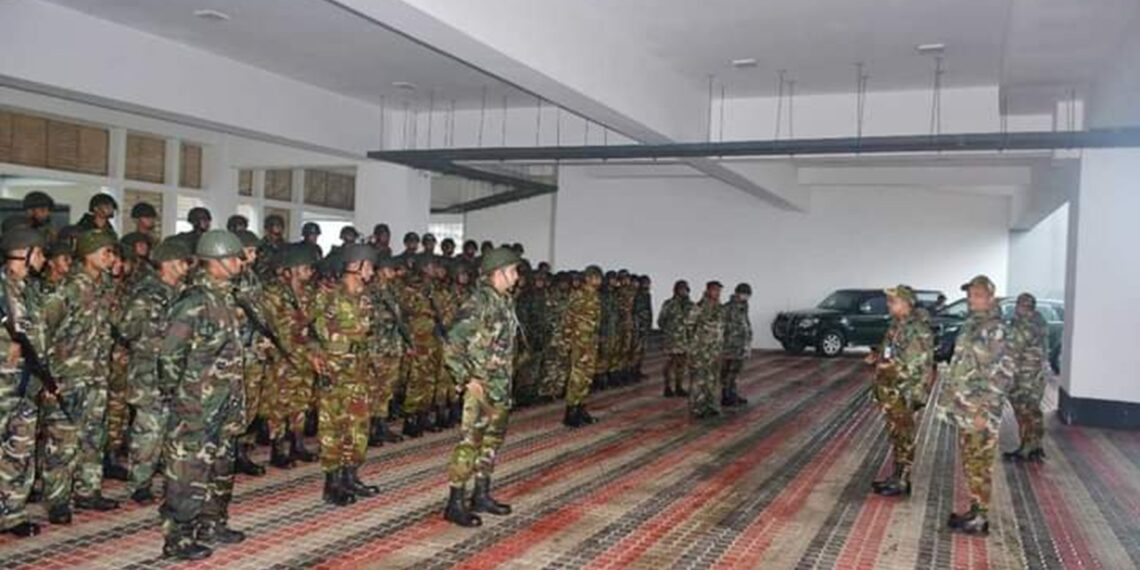The Bangladeshi Army appears to be vertically split on the issue of the contentious “humanitarian corridor” propounded by the country’s national security bureaucracy in relation to the so-called repatriation of hundreds of thousands of Rohingya refugees living in camps in Cox’s Bazar.
While one section of the Army, primarily the Armed Forces Division (AFD) and the Directorate General of Forces Intelligence (DGFI), views the “national security” issue, that needs a “decisive response”, it seeks to play a “more active and comprehensive role in securing the border, ensuring stability, and ensuring the nation’s sovereignty”.
In a policy paper circulated among a select group of senior officers, this section is of the opinion that the “only way to effectively address the ongoing border security challenges, maintain a stable humanitarian corridor and reduce the burden on the BGB is declaring the Bangladesh-Myanmar border a Military Operations Zone (MOZ)”.
This, the policy brief argues, would allow the Bangladesh armed forces to “take full control of the border and secure it effectively, enabling the proper distribution of resources and freeing up the BGB for other important security tasks, including the managing the border with India”.
The other section within the Army, primarily led by General Waker-uz-Zaman and some of the General Officers Commanding (GOCs), believes that the prevailing security situation along the Bangladesh-Myanmar border is an outcome of the geopolitical and geostrategic measures that the United States seeks to put in motion by employing the Bangladesh Army in clandestinely backing the Arakan Army and other People’s Defence Forces in Myanmar.
For this section, the emergent security situation in Bangladesh and Myanmar could cast a shadow over China, Russia and India – each with their economic interests in the Rakhine State – who could get enmeshed in a “geopolitical competition” that in turn could push Bangladesh to the centre of this storm.
It is feared by this group within the Army that in the event of a failed a military operation, involving the Arakan Army and PDFs, could further destablise the Rakhine State that could become a hotbed for increased narcotics smuggling, gun-running and other related security threats that would have a direct bearing on Bangladesh’s security.
Those in the Army who adhere to this view fear that the proposed “humanitarian corridor” and the strong opposition to it by Myanmar’s ruling military junta could push these forces to exercise a powerful military option that could spark a new conflict along Bangladesh’s border. This in turn could encourage New Delhi and Beijing to exert influence on Naypidaw to apply “strategic pressure” on Dhaka, this second section in the Bangladesh Army has evaluated.
The section in the Army that favours a stronger response – in terms of declaring the border a Military Operations Zone – views the Rohingya refugee crisis as “more dire than ever”.
This, senior officers in this section, see as a burden that has “increasingly overwhelmed” the BGB and “diverted manpower away from core security tasks, including preventing illegal border crossings and monitoring for potential threats”.
Describing the Arakan Army as a “destabilising force along the Myanmar side of the border”, the pro-MOZ section among the Bangladeshi officer corps holds the insurgent outfit’s actions as having “direct implications for Bangladesh’s security”.
As the Arakan Army “continues to strengthen its hold on the border region”, it has shown no hesitation in carrying out cross-border activities that destabilise the situation along the border,” the policy brief says.
This section of Army officers conclude that creating an MOZ would “allow for enhanced surveillance, more robust border defences and the creation of a safe, stable environment for humanitarian operations”.
The “rationale” behind creating an MOZ is “straightforward”, the policy brief suggests, as “Bangladesh’s security cannot be compromised by the growing threat of cross-border insurgency, refugee influxes and potential militant activity”.
ALSO READ: Tripura free of insurgency, CM urges tourists to explore state’s attractions
While recognising that the Bangladesh has lost “effective control” of its borders with Myanmar, the policy brief has proposed deployment of “specialised border security units, along with rapid-response teams”, in “critical areas”. These units “could be supported by the Navy and Air Force for air surveillance and rapid deployment”.
Proposing the “real-time” use of “surveillance systems, including UAVs (TB2 drones), satellite imagery and radar, the policy brief seeks a “shoot-on-sight policy” on the Bangladesh-Myanmar border against “hostile forces”, including the Arakan Army, who “may attempt to use Bangladesh as a staging ground”.















